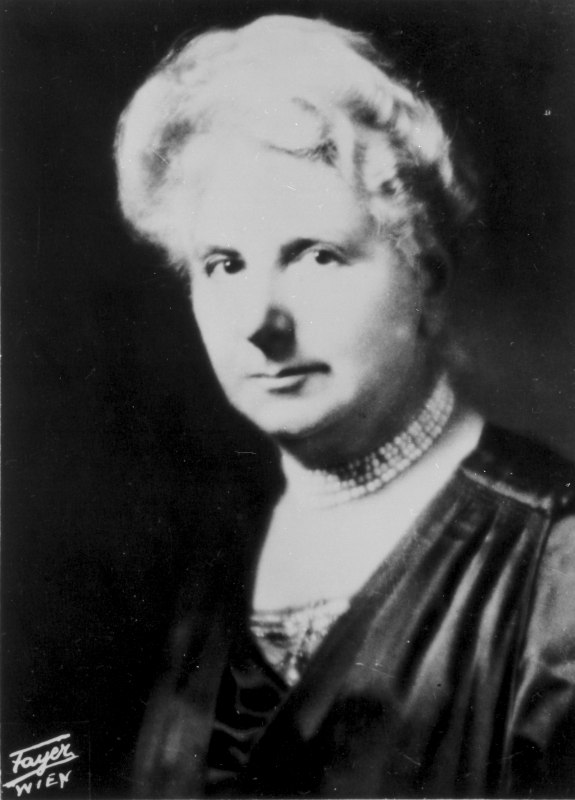Elise Richter, tit. ao. Univ.-Prof. Dr. phil.
4th graduated woman at the University of Vienna (Dr. phil., July 2, 1901)
1st woman promoted “Privatdozent” at the University of Vienna (1905/1907)
1st woman with the title “ao. Universitätsprofessors” in Austria (1921)
Ehrungen
| Ehrung | Titel | Datierung | Fakultät | |
|---|---|---|---|---|
| Ehrentafel-Fakultät | 1981 | Philosophische Fakultät |
Auf Antrag von Kurt Schubert (Judaistik) und Wolfgang Pollak (Romanistik) beschloss das Fakultätskollegium der Geisteswissenschaftlichen Fakultät im Jänner 1981, die Aufnahme von Elise Richter in die Ehrentafel der Philosophischen Fakultät zu beantragen:
Der Akademische Senat der Universität Wien stimmte dem Antrag in seiner Sitzung vom 26. März 1981 einstimmig zu und die Eintragung wurde Anfang April 1981 beauftragt. At the request of Kurt Schubert (Jewish Studies) and Wolfgang Pollak (Romance Studies), the Faculty Board of the Faculty of Humanities decided in January 1981 to apply for Elise Richter to be included in the Faculty of Humanities' plaque of honor:
The Academic Senate of the University of Vienna unanimously approved the motion at its meeting on March 26, 1981, and the registration was commissioned at the beginning of April 1981. |
|
| Denkmal | Reliefporträt im Institut für Romanistik | 1985 | Geisteswissenschaftliche Fakultät |
|
| Tor der Erinnerung | Richter-Tor | 1998 | Geisteswissenschaftliche Fakultät |
|
| Raumbenennung | Elise-Richter-Saal | 2003 | Geistes- und Kulturwissenschaftliche Fakultät |
|
| Stipendien/Preise/Stiftungen | Elise-Richter-Programm | 2005 (2024 eingestellt) |
Im Juli 2024 stellte der FWF (Fonds zur Förderung von Wissenschaft und Forschung) das Senior-Postdoc Elise-Richter Programm sowie das Elise-Richter-PEEK-Programm (für künstlerisch-wissenschaftlich tätige Frauen) ein und verleiht stattdessen die ASTRA-Preise.
In July 2024, the FWF (Austrian Science Fund) discontinued the Senior Postdoc Elise Richter Program and the Elise Richter PEEK Program (for women working in the arts and sciences) and instead awards the ASTRA Prizes. |
|
| Denkmal Arkadenhof | 2016 | Philologisch-Kulturwissenschaftliche Fakultät |
|
- Romanistik
- Romanische Philologie
- Philosophische Fakultät
Elise Richter was born as daughter of the head physician of the Southern Railway Company (Südbahngesellschaft) Dr. Maximilian Richter and his wife Emilie (nee Lackenbacher) in Vienna. Because girls were not allowed to visit schools regularly, Elise and her older sister Helene Richter (later anglist and theater scientist) received private lessons at home.
From 1891 on Elise Richter was permitted to visit individual lectures at the University of Vienna as a guest student. When women were allowed to graduate from high school in Austria, she was the first woman to receive graduation at the Akademische Gymnasium in Wien 1, Beethovenplatz 1, as external student in 1897. As one of the first women she began to study at the Philosophical School of the University of Vienna as ordinary student in the same year. She took lectures in Romanistic studies, General Linguistics, Classical Philology and German Philology and graduated in 1901with the academic degree 'Dr. phil.'.
Elise Richter was also the first woman, who was promoted to “Privatdozent” at the University of Vienna and got the venia legendi and an untenured lectureship position for Romance language in 1907. In 1921 she was appointed titular associate professor (tit. ao. Prof.) and received an University teaching position for Romance Linguistics, Literature and Phonetics. In 1928 she became head of the department of phonetics at the University of Vienna. She never received the title of an full professor. From the founding in 1922 on she chaired the Association of Austrian Academic Women (Verband der Akademikerinnen Österreichs).
Richter researched on the field of (Romance) Linguistics with an emphasis on phonetics and phonology. Her scientific works also dealt with the psychological basis of the linguistic process. In the area of Language History she researched the internal connection in the development of Romance languages.
Elise Richter was persecuted in times of Nazism as a Jew lost her position and was thrown out of the university in 1938.
Along with her sister Helene, Elise Richter stayed in Vienna. Her last scientific papers (dated 1940 to 1942) could only be published in the Netherlands and in Italy. On Oktober 10th, 1942, she was deported to Theresienstadt, where she died a few months later.
The University of Cologne took possession of the library of Elise and Helene Richter (around 3000 books) in 1942. Since 2005 provenance researches are taking place to reconstruct and restitute the library.
In 1981 her name was inscribed to the plaque of honor of the Faculty of Philosophy in the University of Vienna's main building. A Relief at the Department of Romance Studies commemorates her as the first female lecturer at the University of Vienna (since 1985). In 1998 one of the entrances to the campus of the University of Vienna (passageway Garnisongasse 13- court 9), a “Gate of Remembrance”, was named after Elise Richter and her sister Elise Richter "Richter-Tor". In 1999 an award for outstanding doctoral dissertations and postdoctoral theses from the German Association of Romance Philology was named in her honor, in 2003 an lecture hall at the University of Vienna (the former conference room of the Faculty of Law in the main building of the University on the Ring), in 2005 a program for the support of scientific careers for women of the Austrian Science Fund (FWF) – Elise Richter Program, discontinued in July 2024 and replaced by the ASTRA Prize – and in 2008 a street in the 21st district in Vienna were named in her honor.
In 2016, the Elise Richter memorial was unveiled in the arcaded courtyard of the University of Vienna (artist: Catrin Bolt).
In 1981 her name was inscribed to the plaque of honor of the Faculty of Philosophy in the University of Vienna's main building. A Relief at the Department of Romance Studies commemorates her as the first female lecturer at the University of Vienna (since 1985). In 1998 one of the entrances to the campus of the University of Vienna (passageway Garnisongasse 13- court 9), a “Gate of Remembrance”, was named after Elise Richter and her sister Elise Richter "Richter-Tor". In 1999 an award for outstanding doctoral dissertations and postdoctoral theses from the German Association of Romance Philology was named in her honor, in 2003 an lecture hall at the University of Vienna (the former conference room of the Faculty of Law in the main building of the University on the Ring), in 2005 a program for the support of scientific careers for women of the Austrian Science Fund (FWF) – Elise Richter Program, discontinued in July 2024 and replaced by the ASTRA Prize – and in 2008 a street in the 21st district in Vienna were named in her honor.
In 2016, the Elise Richter memorial was unveiled in the arcaded courtyard of the University of Vienna (artist: Catrin Bolt).
In 1981 her name was inscribed to the plaque of honor of the Faculty of Philosophy in the University of Vienna's main building. A Relief at the Department of Romance Studies commemorates her as the first female lecturer at the University of Vienna (since 1985). In 1998 one of the entrances to the campus of the University of Vienna (passageway Garnisongasse 13- court 9), a “Gate of Remembrance”, was named after Elise Richter and her sister Elise Richter "Richter-Tor". In 1999 an award for outstanding doctoral dissertations and postdoctoral theses from the German Association of Romance Philology was named in her honor, in 2003 an lecture hall at the University of Vienna (the former conference room of the Faculty of Law in the main building of the University on the Ring), in 2005 a program for the support of scientific careers for women of the Austrian Science Fund (FWF) – Elise Richter Program, discontinued in July 2024 and replaced by the ASTRA Prize – and in 2008 a street in the 21st district in Vienna were named in her honor.
In 2016, the Elise Richter memorial was unveiled in the arcaded courtyard of the University of Vienna (artist: Catrin Bolt).
New researches about Elise Richter focus also her sympathies for the Austro-Fascist regime and her aversion against socialdemocracy.
Zuletzt aktualisiert am 31.05.2025 - 19:01
-
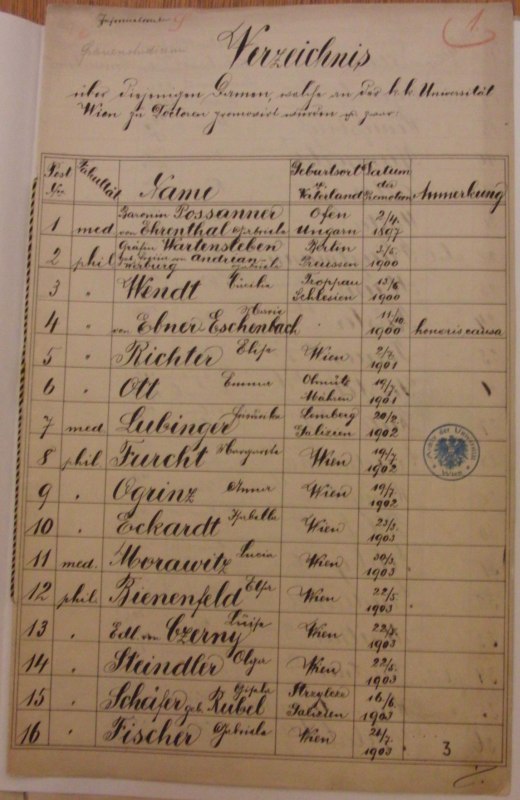
Verzeichnis promovierter Frauen an der Universität Wien, 1897–1923
Anfangs wurde die Promotion von Frauen zu Doktorinnen noch als so außergewöhnlich betrachtet, dass die Universität Wien für Berichtszwecke eigene...
-
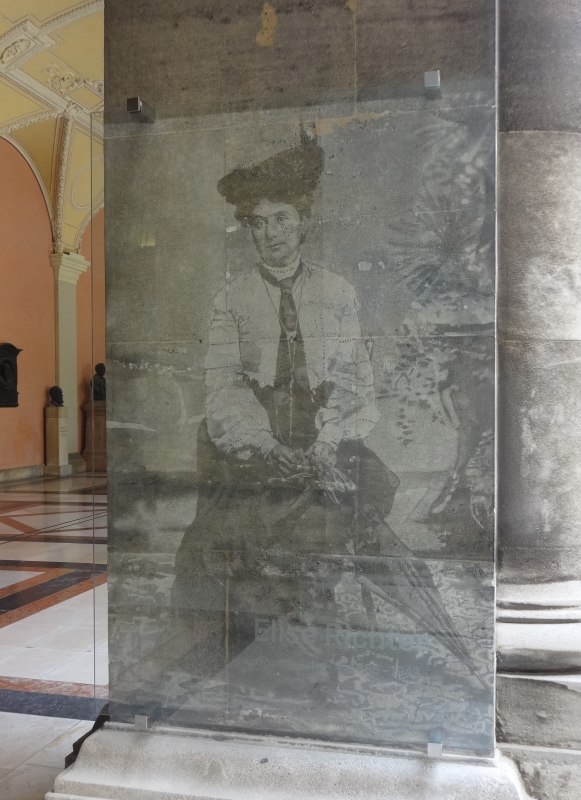
Memorial of Elise Richter in the Arkadenhof (arcaded courtyard) of the University of Vienna (artist: Catrin Bolt)
-
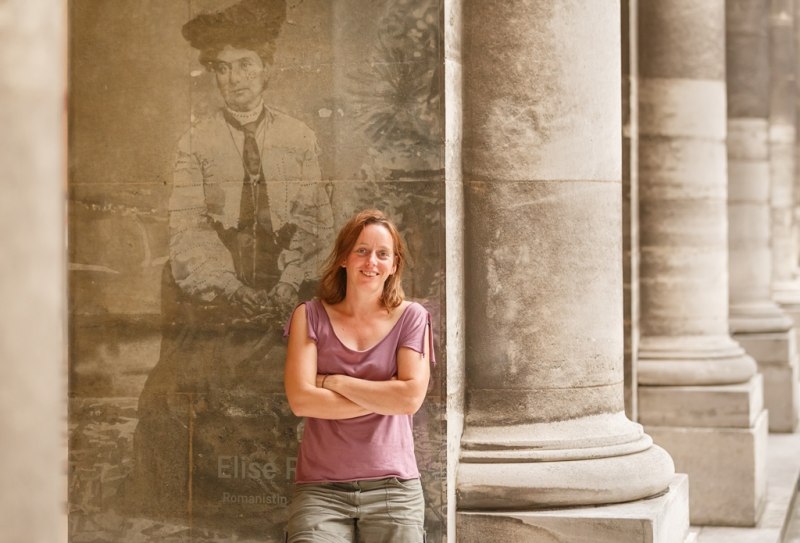
Denkmal für Elise Richter mit der Künstlerin Catrin Bolt (2016)
-
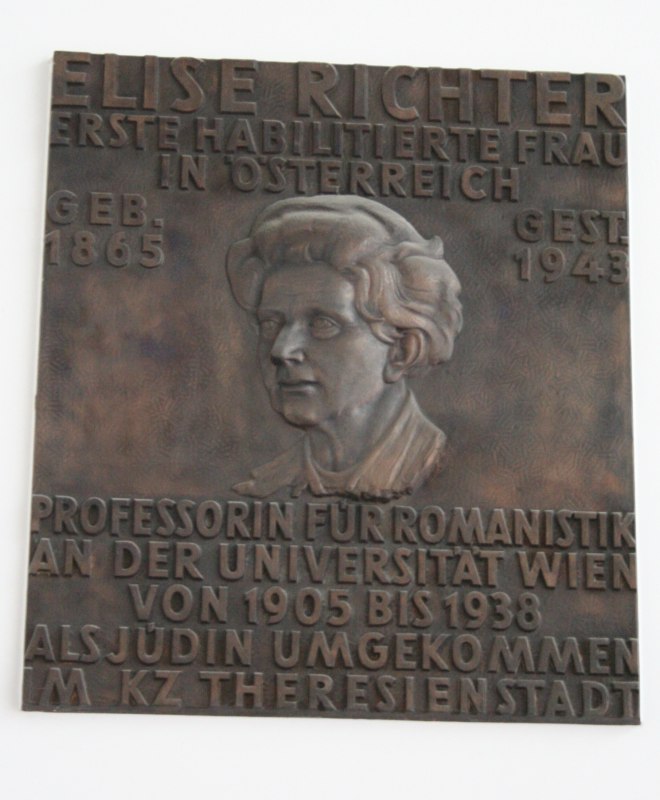
Gedenktafel für Elise Richter (1985) über dem Eingang zur Fachbereichsbibliothek Romanistik im Campus Altes AKH, Hof 8, 2003
-
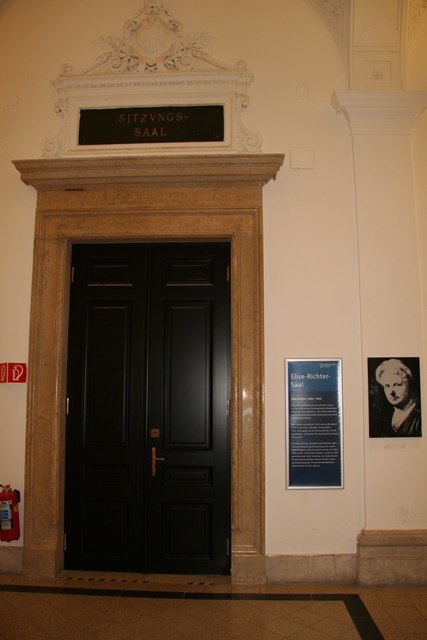
Elise Richter Saal (ehem. Sitzungssaal der Juridischen Fakultät), Zustand 2013
-
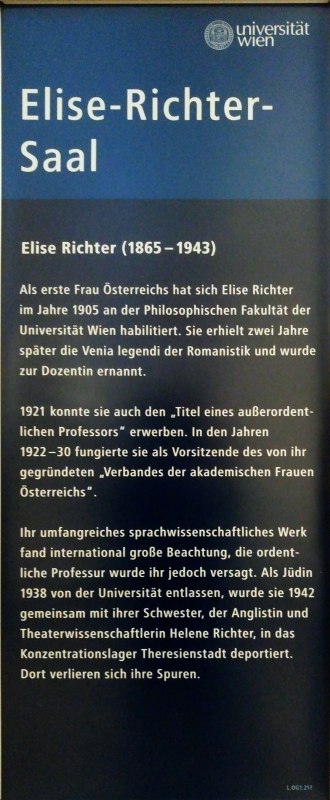
Inscription of the Elise Richter-Saal in the main building of the University of Vienna

